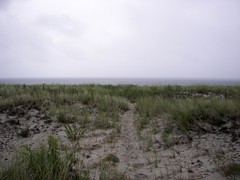Tropical Storm Hanna held off long enough for me to drive down to Plymouth Beach for Scott Hecker's get together at Goldenrod Cottage. I had high hopes for seeing mass quantities of terns, especially roseates, assembling for further migration. As instructed, I parked at the end of the Plymouth Beach parking lot and stood outside my car looking like I needed a ride from someone in a four wheel drive vehicle. As I was getting acquainted with my carpool buddies on the drive down the bumpy road to the cottage, I mentioned my thing about east-facing beaches being a tough place to nest and Diane, who was driving, immediately brought up the effects of global sea level rise. Talk about being around people on my wavelength.
Diane parked a short distance from the cottage so there would be more room for other vehicles to park and we walked the rest of the way. A small flock of common terns flew over my head as I stepped in a puddle. Keer! Keer! Keer! Nice of the terns to greet us.
The point of the festivities (what you thought this was just your average beach side hurricane party?) was for Scott to talk with us about the work of the Goldenrod Foundation and give people a chance to mix and meet with others with an interest in the conservation of Plymouth beach and coastal birds. What absolutely knocked my socks off was hearing him talk about leveraging the power of the piping plover to conserve the barrier beach ecosystem. Yes folks, the cute tiny invisi-birds have the power: the power to keep vehicles off the beach. This makes a big difference not just for the piping plover but for other beach nesting species, for plants, for dunes, for the barrier beach itself. Of course, the power of the plover is backed up by the power of the Endangered Species Act not just by its innate cuteness. Massachusetts has done an outstanding job of protecting the piping plover during the nesting season. What's needed now for the piping plover is protection of the wintering areas and the migration staging areas. And we need to take advantage of their awesome power and cuteness to protect staging areas for other birds like the red knot and the roseate tern.
Despite the numerous forecasts claiming that Hanna would pass well to the west and not dump buckets of rain on us until later in the evening, the heavens opened up just as we were about to walk to the point to see how many of what kind of terns we could see. Scott canceled the walk and I hitched a ride back to my car with a couple of other guests. I hit several bands of heavy rain on the way home but nothing really dangerous. I just heard the rain pick up outside now that I'm home and snug listening to Tim Wakefield's 500th start in a Red Sox uniform on the radio while I try to write something coherent.
I talked up the blog a bit today for those who aren't already readers. Welcome new readers.
Of course, on the way home I was thinking "Yikes, here I am drumming up readers when the piping plovers are gone for the season and the blog will be less interesting." I'd better think of some ways to keep it interesting.
Power to the plovers!

No comments:
Post a Comment